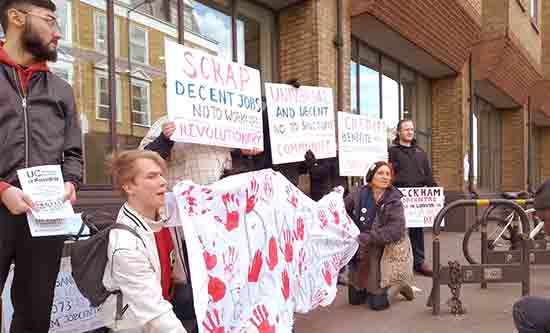
In November 2018, the United Nations (UN) Special Rapporteur on extreme poverty and human rights, Philip Alston, visited Britain. At the time he concluded that the UK government is in a ‘state of denial’ about the misery it is inflicting with its ‘punitive, mean-spirited, and callous’ austerity programme. On 22 May, Alston published his full report to the UN Human Rights Council – a 21-page page indictment of modern Britain, where one fifth of the population live in poverty,1 including one in three children; where the gap in life expectancy between the richest and poorest stands at 7.9 years for women and 9.7 years for men; and where nearly half of those in poverty – 6.9 million people – are from families in which someone has a disability.2 Blame for this state of affairs lies principally with a benefits regime of conditionality and sanctions which Alston likens to a Dickensian workhouse. Seamus Padraic reports
Between 5 and 16 November 2018, Alston held consultations in London, Oxford, Bristol, Newcastle-upon-Tyne, Clacton-on-Sea, Cardiff, Edinburgh, Glasgow, and Belfast; and received 300 written submissions of evidence.
Alston contrasts the UK’s position as the world’s fifth largest economy, and ‘a leading centre of global finance’, with the fact that one fifth of its inhabitants – 14 million people – live in poverty. Alston contrasts the UK’s record-low level of unemployment, with the fact that almost 60% of those in poverty in the UK are in families where someone works. Even full-time employment is no guarantee against in-work poverty: poverty rates outstripped the growth in employment in 2018, and 2.8 million people are living in poverty in families where every adult works full-time.
Single parent households, 90% of which are headed by women, are twice as likely to experience persistent poverty. The lowest-income fifth of single parents will have lost 25% of their income by 2021/2. Almost a third of children in the UK live in poverty, and according to the Equality and Human Rights Commission, cited by Alston, 1.5 million more will fall into poverty by 2021/2, bringing the child poverty rate to 41%, and the child poverty rate for single parent households to 62%. One in ten girls has been unable to afford menstrual products and has missed school as a result.
Nearly half of all those in poverty (6.9 million people) are from families in which someone has a disability. Some families with disabilities are projected to lose £11,000 on average by 2021: more than 30% of their income. 16% of pensioners lived in poverty in 2016/7, up from 13% in 2012/3. Ethnic minority households in the lowest fifth of incomes will lose around 20% of income. As for asylum seekers, Alston writes that ‘Destitution appears to be a design characteristic of the asylum system’, pointing to ‘inadequate, poverty –level income of around £5 a day’, the denial of the right to work, and barriers to healthcare (p18).
The report is clear that ‘welfare reform’ holds special blame for this state of affairs, and that such reform is not simply economic, but represents a ‘commitment to achieving radical social re-engineering – a dramatic restructuring of the relationship between people and the State’ (p5). The drive to reduce benefits ‘by every means available’ including constant reductions in levels, ever-more-demanding conditions, harsher penalties, depersonalization, stigmatization, and virtually eliminating the possibility of legal redress means that ‘almost any alternative will be more tolerable than seeking to obtain government benefits (p20).
Alston argues that it ‘might seem to some observers that the Department of Work and Pensions has been tasked with designing a digital and sanitised version of the 19th-century workhouse, made infamous by Charles Dickens’ (p5). Responding to critics since, he has said that ‘I think breaking rocks has some similarity to the 35 hours of job search [required per week to receive Universal Credit] for people who have been out of work for months or years. They have to go through the motions but it is completely useless. That seems to me to be very similar to the approach in the old-style workhouse. The underlying mentality is that we are going to make the place sufficiently unpleasant that you really won’t want to be here.’ (The Guardian, 24 May)
Alston concludes by proposing 11 policy reforms, including eliminating the five-week delay to UC payments. The UK government, however, has made it abundantly clear that it has no intention of taking these on board. A DWP spokeswoman labelled the report ‘a completely inaccurate picture of our approach to tackling poverty’. Secretary of State for Work and Pensions Amber Rudd, who last year resigned as Home Secretary after lying to Parliament about her department’s role in the Windrush scandal (see FRFI 264), has announced her intention to lodge a formal complaint with the UN about the report, which she argues is ‘biased’ and lacking in research.
Alston describes the government’s response as ‘a total denial of a set of uncontested facts.’ When he first read the report he thought ‘it might actually be a spoof’ (The Guardian, 24 May). Responding to the DWP’s claim that the UK was one of the ‘happiest places in the world to live’, Alston said that it ‘takes the denial on the part of the government to new heights. The government is proceeding as if the problems I have reported don’t exist.’
Alston’s report is welcome. The working class, however, have had enough reports to last a lifetime. It is not Alston’s recommendations that will improve the lot of the working class in Britain. That will only come if we organise and fight back.
1. Alston measures poverty using the ‘new poverty measure’ devised by the Social Metrics Commission. This measure accounts for available resources beyond income, and specific costs faced by some households eg childcare.
All page numbers refer to the full report, which is available at https://tinyurl.com/y3nsvgx4
Fight Racism! Fight Imperialism! 270 June/July 2019




